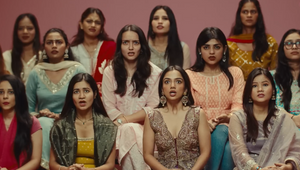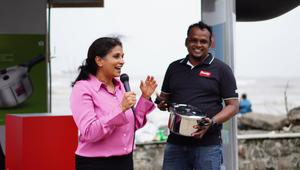
5 Minutes with… Srishti Singh

From paint smells to creative heights, Srishti Singh's artistic career in advertising has been a journey. Known for her work on McDonalds and Deck of Pride, creativity was in Srishti’s upbringing.
Speaking with LBB, Srishti, group creative partner at 22feet Tribal Worldwide, unveils the tapestry of her upbringing — imbued with the aroma of paint and the buzz of advertising dialogues.
Srishti shares how her childhood, surrounded by an artist mother and an advertising entrepreneur father, ignited her passion for storytelling. From transitioning to the dynamic realm of digital advertising to steering creative teams and championing inclusive narratives, Srishti provides a glimpse into her journey, offering valuable perspectives on leadership, innovation, and the profound impact of diverse cultural experiences on her creative prowess.
LBB> How did your upbringing, with an artist mother and an advertising entrepreneur father, influence your decision to pursue a career in advertising?
Srishti> I think it was the smell of paint, one that I quite loved, that drew me into my parent’s printing press. There, I spent much of my time with my mother, who managed it and my father, who had also set up his small advertising agency in the same place.
With ideas and creativity buzzing in the rooms, I found myself at the nexus of artistic dialogues around insights behind current ads and discussions around colour theories. Watching my father sit there, writing copies and drawing up marketing plans, fueled my curiosity. As I got older and started diving into novels and poetry, my dad would pull me into his writing process. Not that I can recall which brand or the tagline it was, but one day, I was told that a line I wrote won the nod for the brand. I remember feeling this weird happiness; from then on, part of me wanted to feel that rush again. I wanted to tell stories and see them impact life and culture.
LBB> You transitioned from traditional advertising to the digital realm. What inspired this shift, and how did this move challenge and shape your creative process and career growth?
Srishti> Traditional advertising made my foundation strong. I loved that insights and ideas were mulled over and in the due time, we just needed to find the best way to execute it.
There, we also had more time to think deeply and discuss. Traditional advertising, as we all know, runs on high budgets, and there is no room for error, especially in the FMG category that I used to work on, as those ads have the strongest influence on people’s choices.
But the world was also moving fast and digital was already growing. To be honest, I didn't know much about it. All I knew was that folks working in digital were hungry to do things differently and shake things up. I trusted myself to understand different kinds of projects, and, most importantly, my love for creating insightful work gave me the confidence to dive into the digital world. On a funny note, I didn't even know what "topical posts" or “ORM” were. It all seemed strange at first, but the challenge was exciting!
LBB> What were the pivotal moments or experiences propelled your rapid career journey at 22feet Tribal Worldwide?
Srishti> I had just joined the agency and was thrown into a big pitch—it was my first time working with our agency's CDs, ACDs, and NCDs. It felt like stepping into the lion's den, but my seniors spotted something in me amidst the whirlwind. They started giving me more chances, letting me slowly take charge of things. It wasn't just about these significant moments but about consistently putting in hard and good work. And more importantly, it was about showing up and stepping up when time called for it. As Vishnu, our current NCD, would say, I never lost my voice and individuality. Success, I believe, comes down to your efforts and the environment you're in, and I can proudly say that 22feet played a considerable role in raising me well. As I became the Group Creative Partner, I was mentored through the DDB India Phyllis programme to learn from other leaders how to find my footing as one. It’s a journey, and I love learning as I go along.
LBB> Could you share some insights into your approach to leading a creative team? What principles or values do you prioritise in fostering a collaborative and innovative environment?
Srishti> I think of my team like a set of Lego pieces. Each has its strengths, and where one falls short, others step in to fill the gap. I've always believed in building partnerships at work—I'm not just their manager but also their creative companion. The pandemic threw us all a curveball, especially our team members, who had to meet and connect online. When we finally returned to the office, collaboration was a bit shaky. Since then, the organisation and I have been pushing our team to work closely with different departments as much as possible. In terms of principles, I value honesty. I like people who speak their minds. From day one, I've encouraged my team to be brutally honest about ideas, not to hold back, and to share their perspectives freely. I don't want a team of 'yes' people; just like when I was starting out, I never wanted my voice to be silenced. It's crucial for me that my team feels that same confidence.
LBB> How important is it for you to infuse societal values and inclusivity into your creative work?
Srishti> Back in my junior days, I found myself working on brands that I genuinely did not like. They lacked inclusivity, even in their product offerings. Having to write around the stigma these brands carried was soul-crushing. It was truly difficult to find those words and form those sentences. Eventually, I reached a point where I couldn't continue down that path. I wanted to advance in my career without sacrificing my conscience and morals.
When Words of Pride, a project centred on pride, was born, I again found myself searching for the right words. This time, however, I was determined to find them. Language can reshape our understanding, give people new perspectives, and, most importantly, foster empathy. This particular project focused on curating respectful words in India's 22 official languages for the LGBTQIA+ community—a community that, in our native tongues, often lacks non-offensive terms.
Throughout this journey, I've learned a great deal, found my unconscious biases, and, yes, made mistakes. But the support from our partners from the community, who worked alongside us, has been invaluable in guiding me towards becoming a better human being.
In all my endeavours, especially in storytelling, I constantly ask myself if the intent is in the right place. I wonder whether what we're doing is genuine and not just tokenism. Are we bringing forth authentic stories and collaborating with those whose voices deserve to be heard the most? In inclusive storytelling, sometimes taking a backseat and allowing the right people to take centre stage is crucial.
In advertising, there's a common demand: "Make it aspirational." It's time to shift that paradigm. It's time we create ads that don't just leave the audience with a sense of an aspirational lifestyle but inspire an aspirational way of thinking.
LBB> Winning accolades at Kyoorius, Effies, and Smarties, and being shortlisted at OneShow is quite an achievement. What, in your opinion, sets apart your campaigns in terms of out-of-the-box thinking, leadership, and execution?
Srishti> When you let go of the need to find big budgets acceptable advertising tropes, and always do precisely what the clients asked for, you can make magic happen. Sometimes, even an hour is enough to execute a great idea. For example, during the pandemic, we won a baby elephant at Kyoorius for McDonald’s Drive Thru day activation - #DriveThruCodes. The idea was a simple fact - drive-thrus are nothing without cars. And so it was simple: we just had to talk about the cars and not our food that day. I think out-of-the-box thinking is necessary, but the commitment to make it happen from a whole group of people is uncompromising. Though a very small piece with zero budget, drive-thru day had almost 10 people in rotation writing live riddles on Twitter for the audience to guess which car was in our drive-thru and interact with them in real-time with fun responses. Not all were on the brand; some just jumped on board because we needed people and caught on to the brand tonality in less than a minute. It was amazing to see that energy sadly, we could only be together virtually. I remember this being the first time I realised that my team functions smoothly and becomes excited only when I pass on the ownership of an idea to them. Simultaneously, I unlearned and let go of doing everything by myself. The work belongs to all, and we can never do things alone. I believe this realisation is crucial for new leaders to embrace.
On the other hand, Deck of Pride was a reimagined deck of cards that was made with LGBTQIA+ artists to make the king, queen, and jack portrayed beyond the binary. This piece’s credit goes to the artists truly. Their experiences, their identities, and their stories are what made it happen. As I said, we were the supporting crew to get their vision out.
LBB> Finally, your passion for travel is evident. How does exposure to different cultures and experiences impact your storytelling abilities and creative thinking within your professional role?
Srishti> I travel because I enjoy people-watching and being around nature. I'm not the trekking type, but I appreciate nature. One thing I've heard that has stuck with me is a sense of calmness that allows for clearer thoughts or sometimes no thoughts when surrounded by nature. This is because it's the only thing humans are not actively competing against; we can't outdo nature, and thus, there is no sense of competition. The world of advertising is cutthroat, constantly pushing for improvement. However, what travel has taught me is that if I can let go of competitive anxiety from time to time, I might be able to think and ideate better. And sometimes, be okay with not having any thoughts at all.















